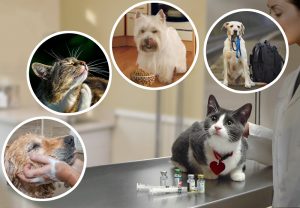 As veterinary professionals, we naturally love animals and enjoy caring for them each day. In addition to being doctors, we are teachers. We carefully listen to the questions asked by concerned pet owners and then thoroughly answer them in a way that provides pets with the best care possible, in the hospital and at home. Here is a list of frequently asked questions by pet owners. Have you asked at least one of these during your pet’s last visit to the veterinarian?
As veterinary professionals, we naturally love animals and enjoy caring for them each day. In addition to being doctors, we are teachers. We carefully listen to the questions asked by concerned pet owners and then thoroughly answer them in a way that provides pets with the best care possible, in the hospital and at home. Here is a list of frequently asked questions by pet owners. Have you asked at least one of these during your pet’s last visit to the veterinarian?
Nutrition-related concerns are common because there are so many choices. First, we like to know what your preferences are as a pet owner. Many people want their pets to eat in a way that matches the choices they make for themselves. This includes eating organically, gluten-free, or preservative free. Fortunately there is a wide selection of complete and balanced pet foods to help you accomplish this goal.
If you prefer a simple commercial name-brand pet food, something with the AAFCO (Association of American Feed Control Officials) seal is a good choice. This seal ensures that the food is complete and balanced for all life stages of your pet. The feeding guidelines on the label will help you determine the quantity of food. However, the actual amount of food will depend upon:
If you have any questions, be sure to consult with your veterinarian.
This is often a choice based on the preference of the owner and the pet. In cases of certain diseases or treatments, the options should be discussed with your veterinarian or a veterinary nutritionist.
For more feeding guidelines, visit the American College of Veterinary Nutritionists.
Depending upon the species, coat, and environment, many pets only need to be bathed when they are dirty or smelly. Your pet’s coat provides natural protection and insulation from heat, cold, and dirt.
Many pets have an oil layer on their skin that provides further protection and helps keep the skin healthy. When bathing, that oil layer is often temporarily removed, and if the pet is bathed too frequently, it may lead to dry skin. Basic grooming, such as trimming non-shedding coats and brushing or combing shedding coats, is usually sufficient to keep your pet clean.
When a bath is required, choose a gentle shampoo that is made specifically for pets. If your pet requires more frequent bathing, consider using a conditioner or rinse after shampooing.
Your pet may have a skin condition and require a trip to the veterinarian if you notice the following:
• A persistent odor to the skin
• Persistent scratching
• Open sores
The doctor may prescribe a medicated shampoo and recommend a bathing schedule. A referral to a veterinary dermatologist may be made if the problem is severe or difficult to treat.
Veterinarians will often provide a schedule depending upon vaccination and preventative care needs. Young pets will initially require more visits during the first few months. Healthy young adult pets should be examined at least yearly. Older pets, or pets with special health needs, may need be seen every six months or sooner.
Most veterinary hospitals make arrangements for after-hours coverage. They may cover their own emergencies or refer them to another hospital that is open 24 hours or just overnight. Ask your primary care veterinarian for this information in advance. It may also be available on their after-hours answering message.
Preventative care is very important. In addition to the basics of good nutrition, fresh water, and appropriate housing or protection from extreme weather conditions, there are several things you can do to keep your pet and your family healthy and safe.
For more information on how to keep your pet healthy and happy, be sure to speak with your veterinarian. If you are looking for a veterinary specialist, visit the Red Bank Veterinary Hospital website.